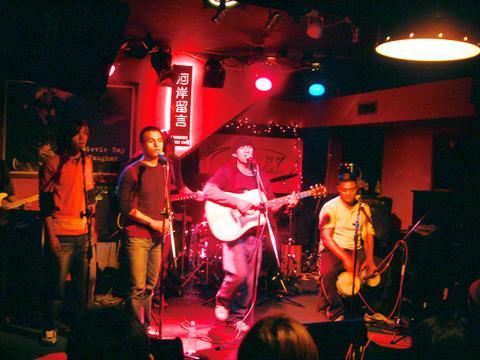One of the most engaging Aboriginal artists, if not the most famous, Biung is appearing tomorrow night at the Riverside Music Cafe.
Wang Hong-en (

PHOTO COURTESY OF RIVERSIDE MUSIC CAFE
More recently, Biung has channeled his fondness for writing about his ancestral heritage into a nightly television program highlighting the treatment of Aborigines during the Japanese occupation of Taiwan. The program airs nightly at 8pm on public television.
With homegrown lyrics that both emphasize his ethnic background and are a diary of his childhood experiences, most of his songs are written in the Bunun language. "Bunun is my mother tongue so when I am singing about my experiences it seems appropriate to sing in my native language."
At 28, Biung has already released two albums in addition to receiving a Golden Melody Award for Best Non-Mandarin Male Singer in 2002. His first album, The Hunter, was completed while he was still a college student and recorded entirely in his native language. In order to garner a larger audience, however, Biung decided to include songs in Mandarin on his second album, Biung.
What sets Biung apart from his Aboriginal contemporaries is his style, which marries traditional Bunun music with an upbeat pop-esque sound. While he denies that Taiwanese Mando-pop has had any large effect on his music, he does confess to listening to Western pop artists such as Michael Jackson and Linkin Park.
"I don't put any limitations on the kind of music I listen to, but musically the biggest inspiration to me has been traditional Bunun music.
Although the audience can't understand all of his lyrics, it doesn't stop crowds of people from packing in to see Biung perform live.
Geddy Lin (
Whether it's salvation from another night at a monster club in Taipei or simply to change things up, Biung provides a good introduction to one of Taiwan's unique Aboriginal sounds.
Performance notes:
Biung will perform tomorrow night at Riverside Music Cafe
Tickets cost NT$300.
For details call (02) 2368 7310.

April 14 to April 20 In March 1947, Sising Katadrepan urged the government to drop the “high mountain people” (高山族) designation for Indigenous Taiwanese and refer to them as “Taiwan people” (台灣族). He considered the term derogatory, arguing that it made them sound like animals. The Taiwan Provincial Government agreed to stop using the term, stating that Indigenous Taiwanese suffered all sorts of discrimination and oppression under the Japanese and were forced to live in the mountains as outsiders to society. Now, under the new regime, they would be seen as equals, thus they should be henceforth

Last week, the the National Immigration Agency (NIA) told the legislature that more than 10,000 naturalized Taiwanese citizens from the People’s Republic of China (PRC) risked having their citizenship revoked if they failed to provide proof that they had renounced their Chinese household registration within the next three months. Renunciation is required under the Act Governing Relations Between the People of the Taiwan Area and the Mainland Area (臺灣地區與大陸地區人民關係條例), as amended in 2004, though it was only a legal requirement after 2000. Prior to that, it had been only an administrative requirement since the Nationality Act (國籍法) was established in

Three big changes have transformed the landscape of Taiwan’s local patronage factions: Increasing Democratic Progressive Party (DPP) involvement, rising new factions and the Chinese Nationalist Party’s (KMT) significantly weakened control. GREEN FACTIONS It is said that “south of the Zhuoshui River (濁水溪), there is no blue-green divide,” meaning that from Yunlin County south there is no difference between KMT and DPP politicians. This is not always true, but there is more than a grain of truth to it. Traditionally, DPP factions are viewed as national entities, with their primary function to secure plum positions in the party and government. This is not unusual

US President Donald Trump’s bid to take back control of the Panama Canal has put his counterpart Jose Raul Mulino in a difficult position and revived fears in the Central American country that US military bases will return. After Trump vowed to reclaim the interoceanic waterway from Chinese influence, US Defense Secretary Pete Hegseth signed an agreement with the Mulino administration last week for the US to deploy troops in areas adjacent to the canal. For more than two decades, after handing over control of the strategically vital waterway to Panama in 1999 and dismantling the bases that protected it, Washington has